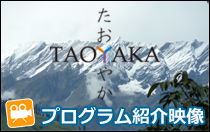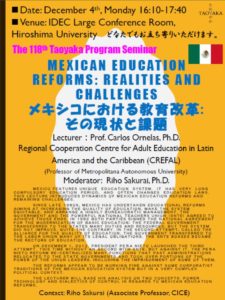(12/4) 第118回たおやかプログラムセミナーを開催します
第118回たおやかプログラムセミナーを開催します
第118回たおやかプログラムセミナーを開催いたします。
参加無料・事前登録不要です。ぜひご参加下さい。
■タイトル:Mexican education reforms: realities and challenges
■講師:Carlos Ornelas, Ph.D. Regional Cooperation Centre for Adult Education in Latin America and the Caribbean (CREFAL)
■日時:2017年12月4日(月)16:10~17:40
■会場:広島大学国際協力研究科1階大会議室
■モデレーター:櫻井 里穂 (教育開発国際協力研究センター・准教授)
■言語:英語
Mexico features unique education system. It has very long compulsory education period, and often changes education laws. This lecture introduces dynamics of Mexican education reforms and remaining challenges.
Since late 1980s, Mexico has undertaken educational reforms aiming at increasing the quality of education, make the system equitable, and arrange a highly bureaucratic management. The government and the powerful National Teachers Union (SNTE) agreed to achieve those ends. In 1992 both parties signed the National Agreement for the Modernization of Basic Education; the federal government transferred to the states many duties and resources, but the system did not improve, quite the contrary. In the second attempt, called the Alliance for the Quality of Education, the government transferred to the Labor Union many of its legal obligations. The SNTE bosses became the rectors of education.
On December 1, 2012, President Peña Nieto launched the third attempt. This time without an accord with SNTE, but against it. The Peña Nieto Reform re-centralized many functions that past administrations relocated to the state governments and took over portions of the power of the Union leaders, including the imprisonment of some of them.
The reforms appear to be working fine against some corporatist traditions of the Mexican education system but in a very complex political context. The lecturer will base his analysis on two concepts: power technology and dialectics of control in regards to Mexican education reforms.






